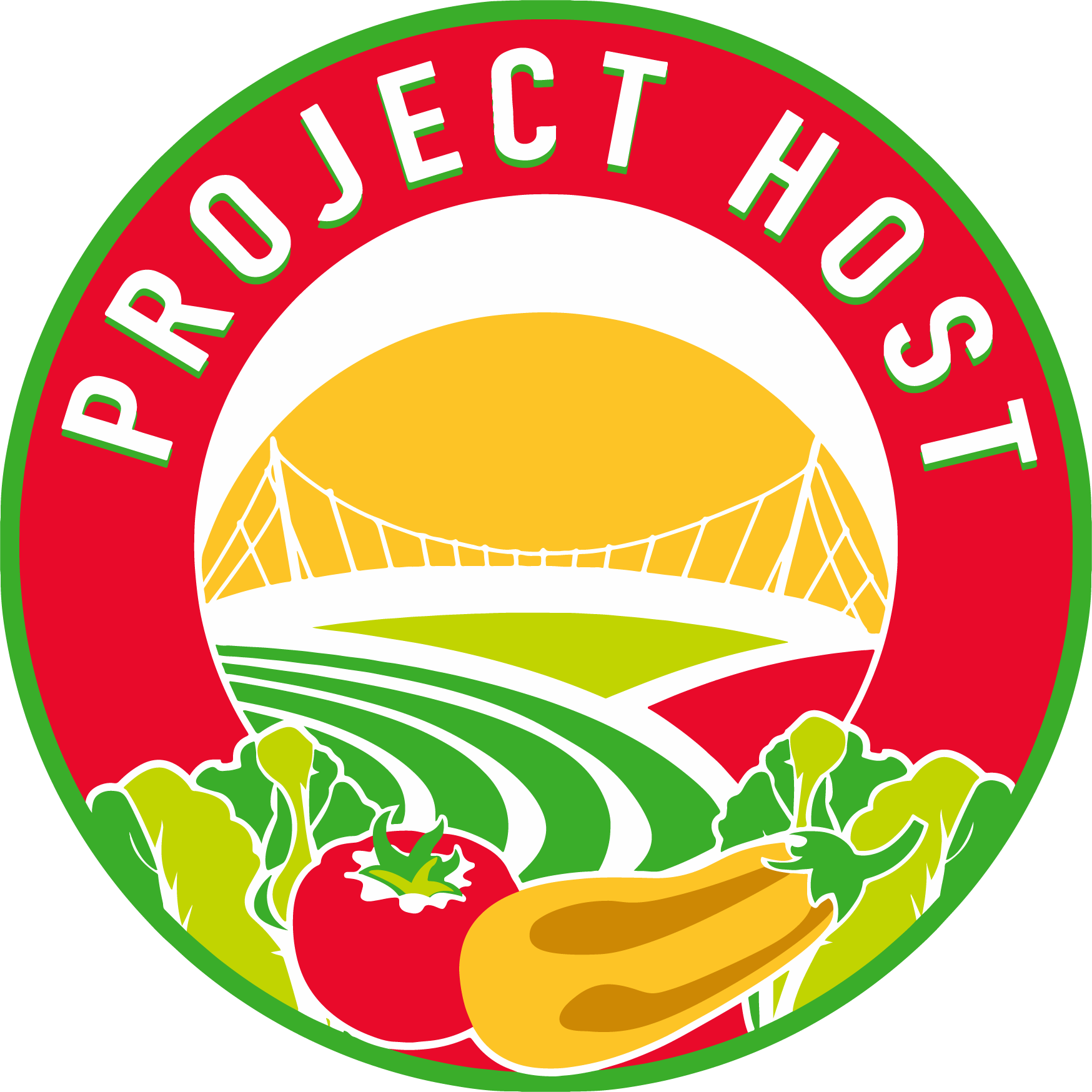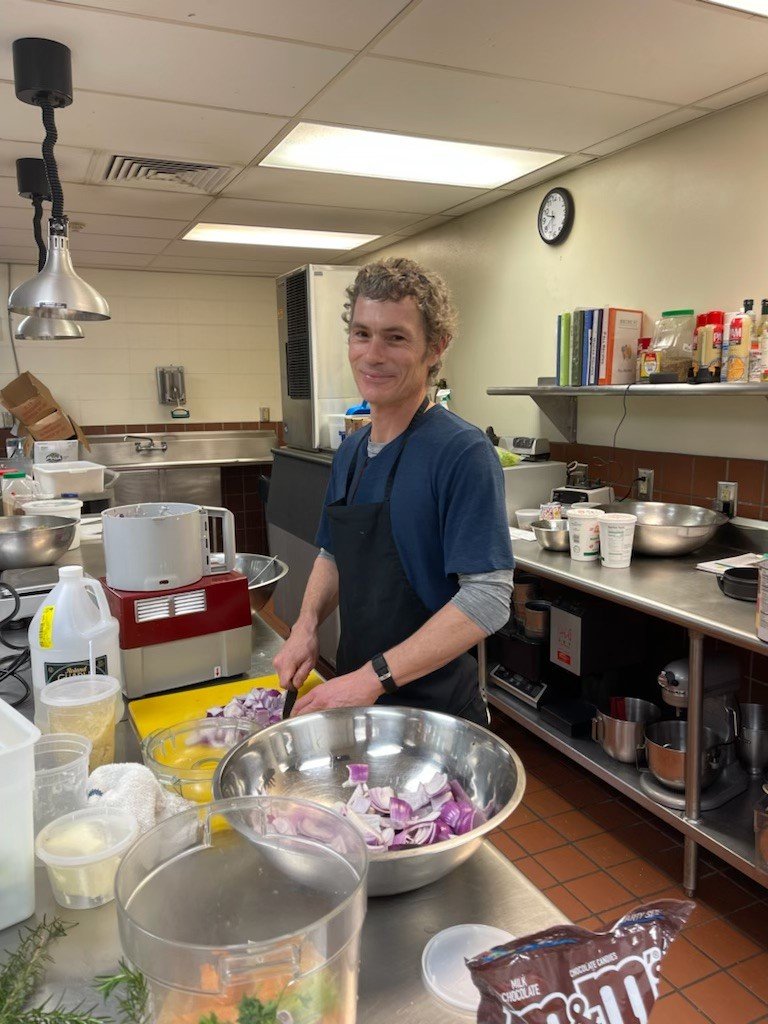The Craft of Cooking: Meet Chef Cary Wolfe
Culinary Instructor Chef Cary Wolfe preps ingredients for Cooking for Kids program meals.
“Some people call cooking an art, but to me, it’s more of a craft.” Skill, experience, finesse, intelligence, and, yes, a touch of creativity, are the building blocks of succeeding in the culinary field according to Project Host’s new Culinary Instructor, Chef Cary Wolfe.
Indeed, Chef Cary’s own path in the culinary field reads like that of a master craftsman of a different era. His interest in cooking developed some 25 years ago when he left his native Anderson, South Carolina, to pursue a journalism degree at University of South Carolina and started picking up shifts at the Columbia establishment restaurant Mr. Friendly’s.
“I’d worked at pizza places and the like in high school, but the job at Mr. Friendly’s was my first real eye-opening experience in higher quality food. During that time, I began to look at food as a creative outlet, a way to express myself.”
Textbooks were slowly replaced by cookbooks, and upon his graduation from USC, Cary decided to pursue a career in the culinary field. Like the craftsmen of old, Cary would not learn his trade through formal schooling, but through a series of apprenticeships, starting with several more years at Mr. Friendly’s.
“By the time I moved on from Mr. Friendly’s, I had my grill shift on Saturday night, my bartender shift on Friday night, I served during the day, I cooked at night, I did everything I could to learn about the restaurant business. I just immersed myself in it.”
From there, Cary moved on to an executive chef position at Motor Supply Bistro in Columbia—the first position in which he felt he could call himself a chef—but he still had many experiences ahead of him that would help hone his craft. Fate or happenstance would launch him into his next phase of development: his journeyman years.
An investor/owner of a ranch in Cody, Wyoming, just happened to be doing business in the Columbia area and just happened to be in Cary’s restaurant at a time when Cary—then in his early 30s—had been working in the Columbia food scene for a decade and was ready for a change. Impressed with Cary’s cooking, the gentleman told Cary he was looking for a head of food and beverage at his ranch and wanted to Cary to come out for an interview. While reluctant at first, Cary ultimately decided to take the plunge, flew out to Wyoming to cook for the owner and his partners, and landed the gig.
“That turned into an five-year traveling deal. My life was a Willie Nelson song.”
Chef Cary spent winters as a self-proclaimed ski bum in Sun Valley, Idaho, springs and summers cooking on the ranch, and falls leading 10-day trips for big game hunters seeking to land prize elk, moose, and bighorn sheep. The latter gig had Chef Cary cooking for people from all over the world and performing some of the most ambitious and unique culinary feats of his career.
“I butchered and cooked everything. The biggest challenge was a bighorn sheep. They are hunted for their busts, but a guy who got one wanted me to cook it. They are the leanest animal—they live on 1,000-foot cliffs—but they have all the regular cuts. I tried every different cut of it. I tried adding fat to it. The flavor was pretty good, but it was hard doing it over a campfire stove with as lean as it was. Cooking a bighorn sheep at 10,000 feet elevation in the Rocky Mountains over a campfire is by far the most ambitious thing I’ve tried to cook.”
Formative and unique as they were, the wandering years had to come to end, and, in the search for greater stability, Chef Cary moved to LeGrange, Georgia, where his family has deep roots. As it happened, he would round out his journeyman years in LeGrange by cultivating his agricultural knowledge and skill on his family’s farm. Chef Cary began small, growing tomatoes and herbs to supply C’Sons Bistro, where he worked as the executive chef, but soon he was farming three acres that supplied C’Sons with most of its produce for the year. He then pivoted to agriculture full time, becoming organic certified and delivering produce to restaurants in Atlanta, Columbus, and LaGrange, and also using what he grew in his own Wolfe Scratch catering business.
At last it was time for Cary to realize the dream of so many in the culinary field: owning his own restaurant. In 2016, Chef Cary opened The Kitchen at Rose Cottage in Pine Mountain, Georgia, a small resort town just outside of LaGrange with nearby Callaway Gardens drawing tourists from around the country. The restaurant had a farm-to-table concept, and Cary drew from all of his past experiences to build the menu.
“I like to tell people it was kind of a mixture of Motor Supply/Mr. Friendly’s meets Rocky Mountains with some fresh tomatoes. We changed the menu every day there. I printed the menu around what me and my dad were growing.”
For almost four years, Chef Cary lived and breathed his restaurant, particularly during the spring and summer when tourists flocked to Pine Mountain, but as the COVID-19 pandemic unfolded and decimated the tourism industry, Chef Cary was forced to close The Kitchen at Rose Cottage. It was in some ways a disappointment, but by Cary’s own admission came at the right time, when the grind of restaurant ownership and the peak-trough nature of working in a resort town were beginning to wear on him.
Restaurant owner, executive chef, farmer, horse wrangler and campfire cook, line cook, bartender, server—in 25 years, Chef Cary had done it all, reaching master craftsman status, but there was still a desire left unfulfilled.
“Having my own restaurant was in a lot of ways a dream. I was growing my produce and making the food I wanted to make, but when I was done with the whole Rocky Mountain experience, I wanted to go a new direction with cooking. The greater good concept is something I’ve always wanted to involve my cooking. It’s great if you enjoy this seabass I prepared for you with your $50 glass of wine, but I hit a dead end with that. I wanted something more with my cooking—to do something positive with it, instead of just going through the motions of preparing beautiful food.”
After his restaurant closed, things all started to come together to bring Cary to Project Host and help him fulfill the wish to do more with his craft. His siblings had both settled in Greenville and had been trying to get Cary to move here for years. A short while after Cary relocated, a mutual friend introduced Cary and Project host CEO Tobin Simpson, and in early 2022, Chef Cary joined the Project Host staff as the new Culinary Instructor. Now he awaits his first class, beginning March 7.
When asked about the prospect of teaching his first class, Chef Cary responds: “I’m very excited about it. I never had an opportunity to be taught things properly, so I’m really excited about sharing some of the things I’ve learned the hard way, the long way, in the 25 years I’ve been doing this and to try to condense that into a six-week class.”
“I want to cherry pick some of the more important concepts beyond the basics of food handling and all of that. There’s a way to work in a professional kitchen that is not like anything else. You have to be artistic, be able to work with your hands, move fast. It’s physically demanding, requiring you to stand for long periods of time. It requires precision work, repetition, attention to detail, and it takes a degree of intelligence. There are a lot of things in formal training that go unsaid that people have to find out on the job. I feel like I could cut to the chase and give students good core tools to help them succeed and excel at a quicker rate.”
Chef Cary and CC Pearce Culinary School graduate Russell Ketzler hit it off right away working in the kitchen together.
Chef Cary, now a master at the culinary craft, is poised to train the next generation of restaurant workers. For him, this opportunity is a privilege not only because he was raised in a family that instilled in him a service mindset, but also because he found himself in need of help along his journey to where he is today.
You see, the truth of Cary’s story is much messier than it’s been told here. The restaurant industry is famously difficult, and Chef Cary was not immune to the challenges and pitfalls that come with the territory. All along his journey there were failures, personal setbacks and struggles, moments of darkness, losing friends, and almost losing himself that make his current role at Project Host so much sweeter:
“I consider it a huge privilege that I have the opportunity to help someone, to maybe open the mind to a new experience. Based on what I’ve been through, I can’t say I’ve walked directly in the shoes of the people I’ll be instructing, but I’ve been through some things and made it out on the other side, and I feel like I have a lot to give from professional and personal experience. I know I wouldn’t have been able to get my life back on track if it weren’t for people helping me. I needed a community. I needed help, and I needed to help people. I’m lucky I made it through, and now I’m excited to give back.”
By Claudia Winkler


